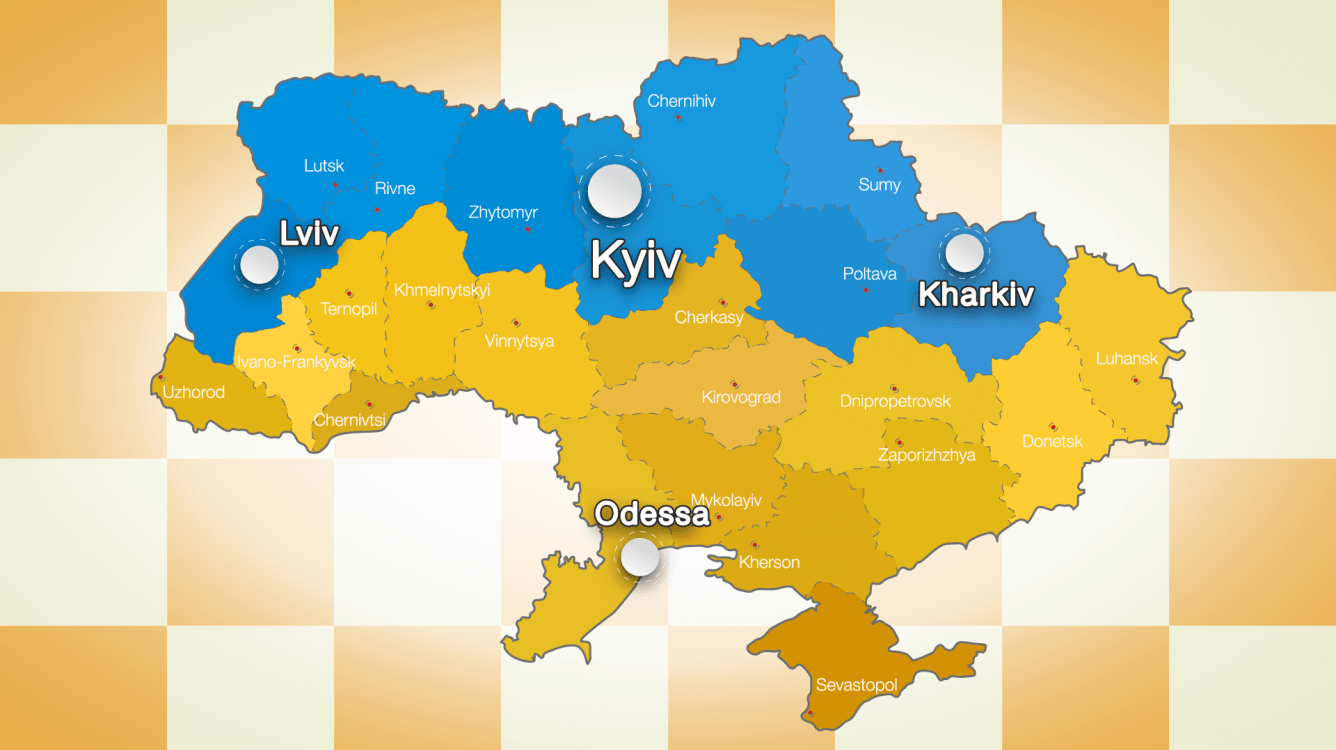
Ukrainian Chess Players In Times Of War
On Thursday, February 24, 2022, 19-year-old GM Kirill Shevchenko and his family woke up from the sounds of numerous explosions not far from them. They took their documents and went to the basement, where they stayed all day and tried to follow the news. The next day, fragments of a rocket hit a neighbor's house 500 meters away, opposite the school of Kirill's 11-year-old brother. The family had to go back to the shelter again and thereupon decided to leave Kyiv. "It was a really tough decision," said Shevchenko.
That Thursday morning, now exactly two weeks ago, changed the lives of all Ukrainians. A full-fledged invasion of the Russian army had started, with the shelling of several cities simultaneously. While the war is still raging on, with multiple negotiations between Ukrainian and Russian officials failing to sort any effect, Chess.com spoke to a number of Ukrainian chess players about how the terrible developments in their country have affected their lives and families.
Those wishing to support Ukraine directly may consider these organizations that have a strong track record of providing effective relief in times of crisis and make it easy to donate:
Kyiv
"Our travel would normally have taken four hours, but it took us 10 hours this time," told Shevchenko, whose family moved to the west-central Ukrainian city of Vinnytsia, about 260 km from Kyiv, on February 25. The road had been full of traffic jams of people escaping to the safer western part of the country, or even abroad.
The Shevchenkos are now staying at the parents of Kirill's father. "When we left Kyiv, we saw many fighter planes above Kyiv and I saw one hitting an object," said Shevchenko. "In Vinnytsia, I also see planes but they look like they're ours."
Shevchenko sees a lot of help from neighboring countries who provide both weapons and humanitarian aid as well as volunteers, but like the president of his country, the young Ukrainian grandmaster doesn't understand why NATO countries are not providing a no-fly zone for Ukraine.
"We need to close the sky. Now they have bombed a children's hospital in Mariupol. They say they only hit military bases but they lie. It's genocide now."
Shevchenko understands that the West is afraid of a nuclear war, but doesn't buy the argument. "I think it's impossible for Putin because then Russia won't be a country anymore either."
In October of 2021, Shevchenko showed his talent by winning the Lindores Abbey blitz tournament in Riga. Online, he was one of the first to ask for help from the chess community, and successfully. Also with the help of Chess.com, GM Hikaru Nakamura held a 12-hour fundraiser stream that raised over $130,000.
131,304$!!!
— Kirill Shevchenko (@Chesser_22) March 2, 2022
I am very proud of our BIG friends from USA. Low bow and huge gratitude to @GMHikaru ,he made this stream possible. Many thanks to @chesscom @DanielRensch for huge donats! Thanks to @IM_Rosen @ben_finegold @Anna_Chess @photochess @akaNemsko for being part of it!✌🇺🇦 pic.twitter.com/HGvCSCqKKT
Shevchenko's grandparents from his mother's side are still in Kyiv. The other day, Shevchenko spoke to his grandfather, who told him about the shelling nearby. "If the rocket hits the ground, your ears tremble. If not, it means the air defense hit the rocket. Then you just hear a big explosion."
Also from Kyiv is 45-year-old Oleksandr Matlak, the Executive Director of the Kyiv Chess Federation. Like many men in his country, he had to say goodbye to his close family. His wife, his two sons (six and 11 years old), and his mother-in-law moved to the western region.
With some exceptions, all men between 18 and 60 years old are not allowed to leave the country—but Matlak wouldn't do that anyway.
"I will stay in Kyiv. Who will defend our city in this case? I was informed I should stay in reserve. If needed, and they will call me, I will join."

Matlak is alone at his home. Asked whether he is relatively safe, he points out that it's the wrong word to use. "There is 'extremely dangerous', 'very dangerous', or 'dangerous'. We have heard explosions and shooting around the city. It has been more or less normal for a few days now, but who knows what tomorrow will bring."
Apart from his work for the local chess federation, Matlak is active for the Ukrainian community on Chess.com and he was the one organizing the blitz tournament last Saturday in memory of Alexey Druzhinets, a children's coach and arbiter who died in the violence of the war on March 2.
But most of the day, Matlak is involved in coordination activities for the territorial defense of his country and with working with volunteers to provide food and clothing to people in need. He says that more chess players are working with him, such as the brothers Igor and Alexander Kovalenko.
"Alexander has been riding around with his bike to provide food and medicine," said Matlak.
GM Igor Kovalenko (FIDE 2674) is actively volunteering in Kyiv and helping his brothers who took up arms. If you want to support him - feel free to open my FB post and find some bank requisites https://t.co/iaFqshLY4j pic.twitter.com/Tqsh7JMlbM
— Pavel Eljanov (@Eljanov) March 2, 2022
Kharkiv
38-year-old GM Pavel Eljanov, a two-time Olympic team gold medal winner, is from Kharkiv, the second-largest city located in the northeast of the country and a city that's been under heavy bombing. Throughout the city, buildings have been hit and sometimes destroyed.
"Every day there is bombing in Kharkiv and it's not the end yet," said Eljanov. "I've heard that about half of the population [totaling roughly 1.5 million] has already left the city, which is hit very badly."
Eljanov left Kharkiv on February 25, a day after the invasion started. That was a big change of plans since he intended to fly to the UAE for coaching work on the 24th, but the flights weren't going anymore.
"We heard the shelling starting on the 24th, around 5 a.m. and it was clear to us that it was a full-fledged invasion."
GM Yuri Timoshenko took a weapon and went to defend our capital. Meantime my native Kharkiv and exactly my dormitory district (Alekseevka) was bombed by Grad missiles this afternoon with dozens of civilian casualties. We'll never forgive and forget! pic.twitter.com/cAFYyK8PbO
— Pavel Eljanov (@Eljanov) February 28, 2022
Eljanov decided to move to his mother, but his ex-wife and daughter stayed in Kharkiv to await developments. A few days later, they moved to the west as well, as it became too risky.
"Fortunately, my home building is still standing," said Eljanov. "My mother's home, in a nine-story building, was damaged but not destroyed completely. It's relatively safe. Some windows were broken."
Eljanov, who only slept for about two hours a night in the first week and could hardly eat, says he is now "restoring his energy" and tries to help people with money and through his connections.
IM Odnorozhenko Evgenyi from Kharkiv took up arms and defending our hero city from russian war criminals. You can follow news from his combat squad here: https://t.co/W3GyQTkBr7. You can find also some details there how to support them via money transfer. #Ukraine️ #Kharkiv 🇺🇦 pic.twitter.com/g3cz0qai6w
— Pavel Eljanov (@Eljanov) March 7, 2022
41-year-old GM Alexander Moiseenko is now in the Poltava region in central Ukraine, but stayed in Kharkiv for 10 days before he finally moved to a safer place together with his sister. He wanted to evacuate his 81-year-old father, who did not want to leave.
"It was not easy to leave, but the war was coming closer and closer. First, a building is destroyed one kilometer away, then a market 700 meters away. Three kilometers away, everything is already destroyed."
The first 10 days of the Russian invasion, Moiseenko and his father stayed in their apartment most of the time because the nearest subway is three kilometers away. "Every night we heard many explosions. In the beginning, you don't understand what's going on and you're just afraid."
Moiseenko, who won the 2013 European Chess Championship, says that a lot of houses and buildings in his neighborhood have been damaged and that a large number of people have been dying. When a power station closeby was attacked, it left Moiseenko's neighborhood without electricity, light, or internet.
"On the third day, I went out, because I had to buy some food. I saw that one big shop was open and about 700 people were queueing. I went to another shop, but there was also some attacking going on. I finally found something in a small shop."
Moiseenko praises the many hard workers that somehow manage to keep the country going. These "heroes without capes" are people who are still running the supermarkets, the trains, the police. People come with cars from the west to help with food, medicine, and clothes. People who volunteer to detonate bombs.
Like Shevchenko, Moiseenko says it's important to have a no-fly zone over Ukraine. "NATO are just chickens. They just sacrifice us. Who is left in the cities? The most heroic people and the most poor and old people, who can die at any moment. People help, but governments only come with empty words."
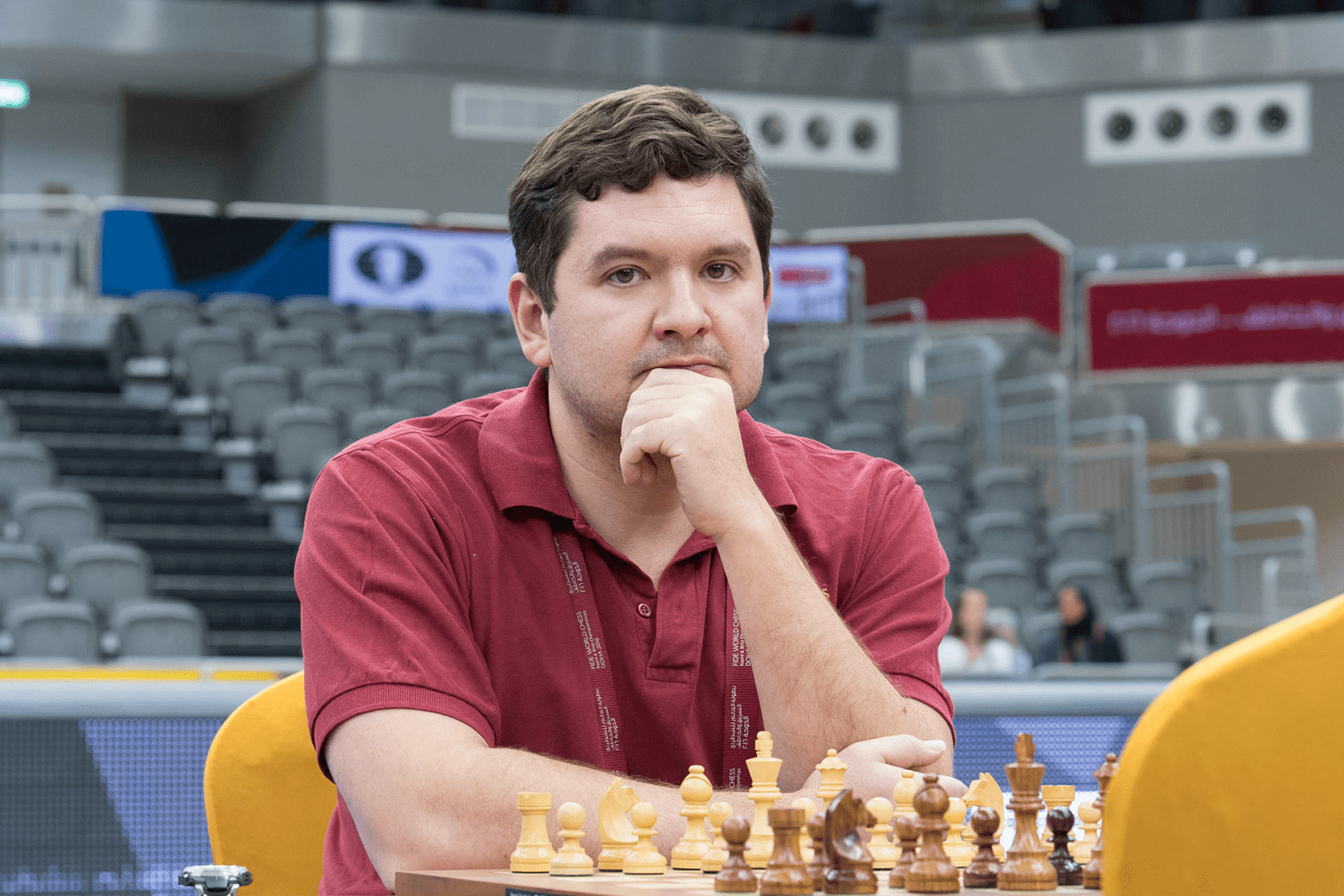
Odessa
42-year-old GM Natalia Zhukova, a two-time European women’s champion and Olympic team gold winner, hasn’t played much chess in recent years, shifting her time mostly to local politics. As a deputy of the Odessa city council, she is working all day and from home in the evenings, after the 8 p.m. curfew starts, helping her co-citizens in any way she can. She was too busy to be able to schedule an interview, but kindly answered some questions by text.
"The first day of the war was a shock because it seemed to me that such a thing is impossible in a civilized world," she said. "On the second day, I started helping."
Together with friends, Zhukova focused on the regional blood transfusion station first. They started driving the doctors to their work and back, as it was difficult to use public transport and taxis in the first days of the war. They also provided the soldiers who guarded the facility with everything necessary.
Then, a city voluntary center was started, which gathers all requests from the Ukrainian army and territorial defense forces. This is where Zhukova works now.
"Every day, 24/7 I'm in contact: I coordinate volunteers, businessmen, city leaders. I'm thinking and deciding how to help people, where to find medications, clothes, mattresses, and other things. I write this text after two weeks of war, while our city of one million people works like a clock, thanks in large part to the major's team."
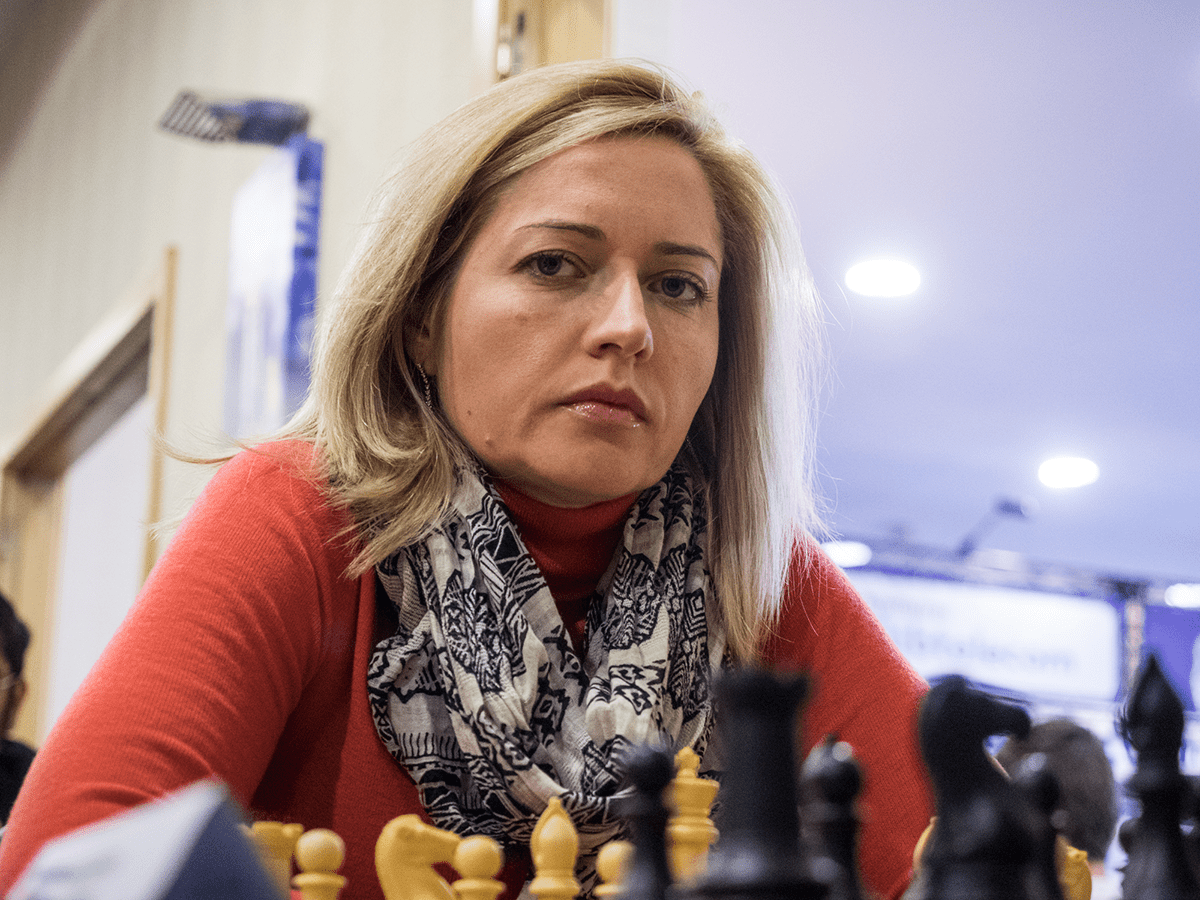
Zhukova's parents and brother currently stay in Kakhovka, a town about 250 km away that was occupied on the second day of the war by the Russian troops.
"I'm in Odessa and going to stay here until my last day. I'm sure that we can defend the city. I see from the inside how much is done to achieve this."
Zhukova says she is thankful to everyone for the support of Ukraine. "We fight not only for our land. We fight for our freedom! We are not scared, because we know that the truth is with us. We stand for the global values of life and freedom. While someone outside Ukraine is thinking about the economic changes or the possibility to play in a tournament, here we are thinking about our survival!"
Like Zhukova, 51-year-old GM Mikhail Golubev has been less involved in chess recently and more in work for the civil sector in Odessa. Known for authoring several chess books in the early 2000s, he became politically active at some point and from 2013, he was part of the Euromaidan movement. After a minor stroke in 2019, for which he now has some difficulty walking, he is now mostly working as a chess coach online.
"I've had concerns with Putin much earlier than most people," Golubev says. "When he took over the NTV channel in 2001, for me that was an early sign."
It was therefore not a complete surprise, what happened two weeks ago: "I cannot say that I was shocked. Let's say at least I was partly prepared. I just hoped Putin was not that mad, but everything turned out to be worse than most people expected, even people who dislike him."
Since the start of Russia's invasion two weeks ago, Golubev has been supporting the GO Kalyna volunteer center to help the territorial defense and the military.
"We get support from the government and municipalities, but a lot depends on volunteers. I am using my contacts to help provide some funds. Not just for weapons, but for everything the army needs to defend. I am doing what I think is the most efficient for me to do."
Odessa hasn't been under many direct attacks just yet, but there have been air raid sirens. Golubev uses chess terminology to describe the situation: "Different variations are possible. You cannot calculate all variations because the position is complicated and you're not sure what the enemy has in mind so you have to prepare for various things."
Friends, I am co-operating with the team of the GO Kalyna volunteer center (Bazarna 25, Odessa) to help the Territorial Defense and the Armed Forces of Ukraine in Odessa/Odesa. If you're willing to help, please send me a PM. pic.twitter.com/CClgyKR3JE
— Mikhail Golubev (@mikhail_golubev) March 8, 2022
Lviv
One of the biggest chess communities of Ukraine is in Lviv, the largest city in the western part of the country, located about 70 kilometers from the Polish border. It is a relatively safe place to be, but it's not clear for how long.
"Yesterday was the first day that we did not have an air raid siren," said GM Andrei Volokitin, a 35-year-old grandmaster from Lviv. His wife and three-year-old daughter have fled to Poland. This means that Volokitin has spare rooms at the moment, and he has used them to help compatriots who fled the eastern part of the country. For example, he hosted Vitaly Zatonskih, the father of IM Anna Zatonskih, for a few days and currently, a woman with two daughters from Kyiv, also from the chess community, is staying at his place.
"I wasn't in the army, I have no fighting skills, so I can only help in other ways," Volokitin said.
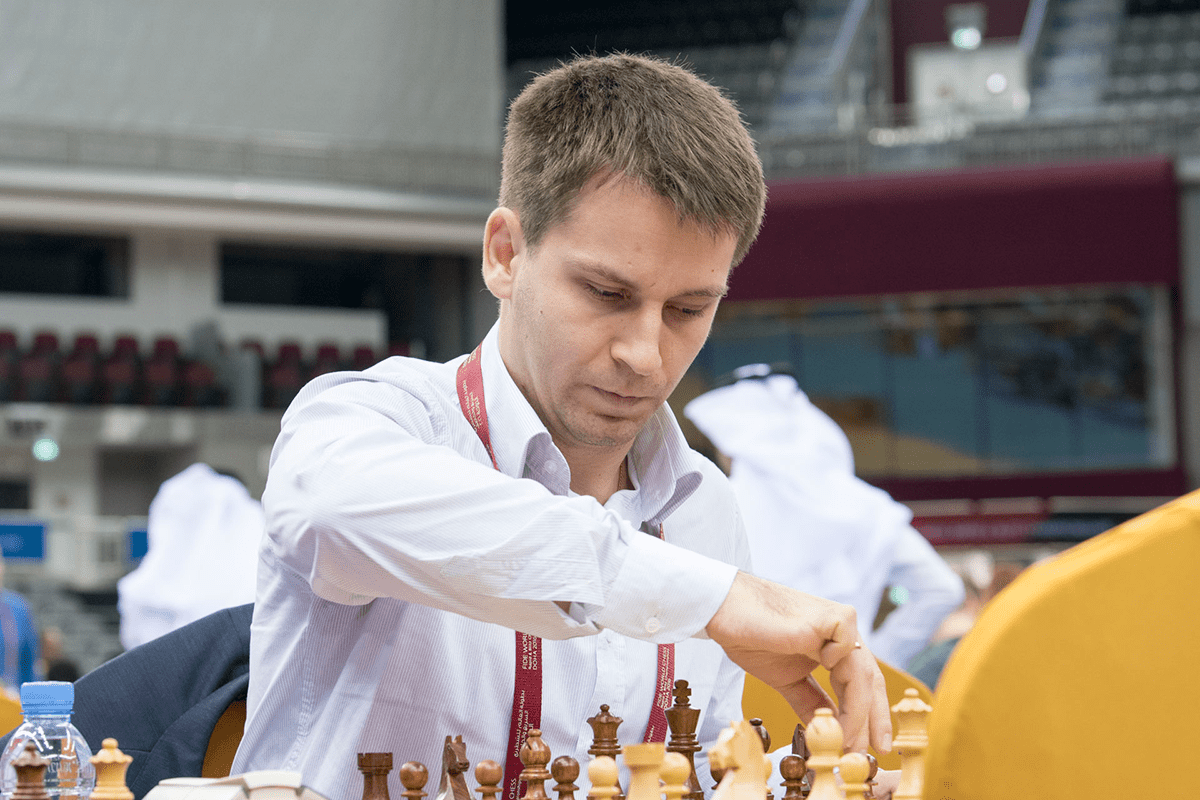
The three-time Ukrainian champion found out in a different way that the invasion had started on February 24. "I woke up at six or seven in the morning and went out with my car to get petrol. There were a lot of cars but no petrol at all."
After a few days of "shock and panic," it was decided that his wife and daughter should leave, but Volokitin's 61-year-old father stayed, as well the husband of his sister, who is a programmer.
"He managed to block some Russian sites!", Volokitin smiled.
Similar to Volokitin, 35-year-old GM Yuriy Kryvoruchko is hosting friends from the chess world in his house in Lviv for shelter. The aforementioned Eljanov stayed at his place for a while. Some of the temporary guests are on their way to Poland, where Kryvoruchko's wife and kids, a five-year-old girl and a two-year-old boy, are as well.
"The first few days were extremely depressing; we didn't feel any support from European countries," said Kryvoruchko, who was the champion of Ukraine in 2013. "It took a few days before the sanctions came. Germany took two or three days to give us… five thousand helmets. Now, we feel a lot of support."
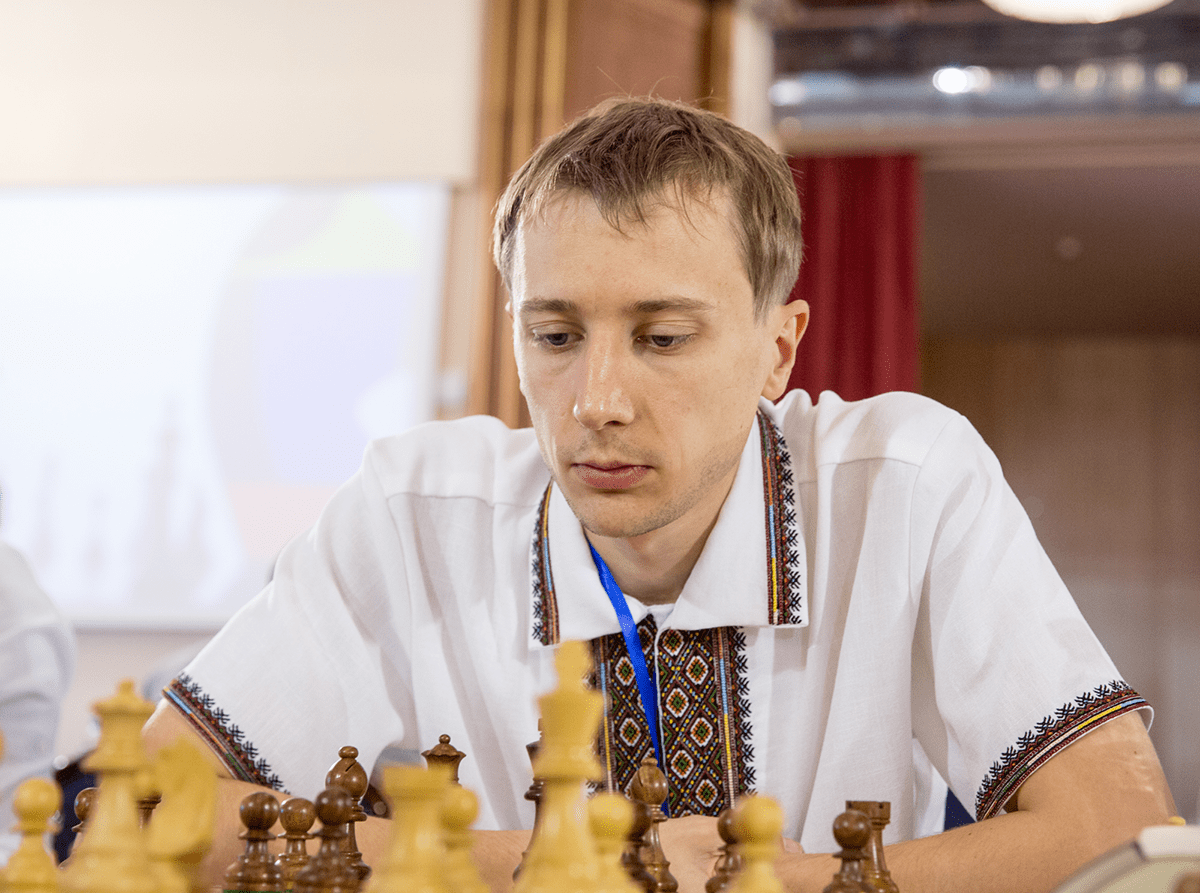
37-year-old WGM Myroslava Hrabinska is one of the players who had to leave her husband behind in Ukraine. She is staying with her sister in Germany, close to Frankfurt.
"Our bodies are safe but our souls are in big pain," she said.
Her husband is 48-year-old IM Vladimir Grabinsky [FIDE's transliteration of Slavic names is not always consistent - PD], a well-known coach in Ukraine who co-wrote the highly acclaimed 2007 book Perfect Your Chess together with one of his students, Volokitin.
"We stayed in Lviv for four days, but the air raid siren kept repeating regularly," told Hrabrinska. "We were hiding in the bathroom as there is no underground nearby. We needed to sleep in our clothes in order to always be ready to hide."
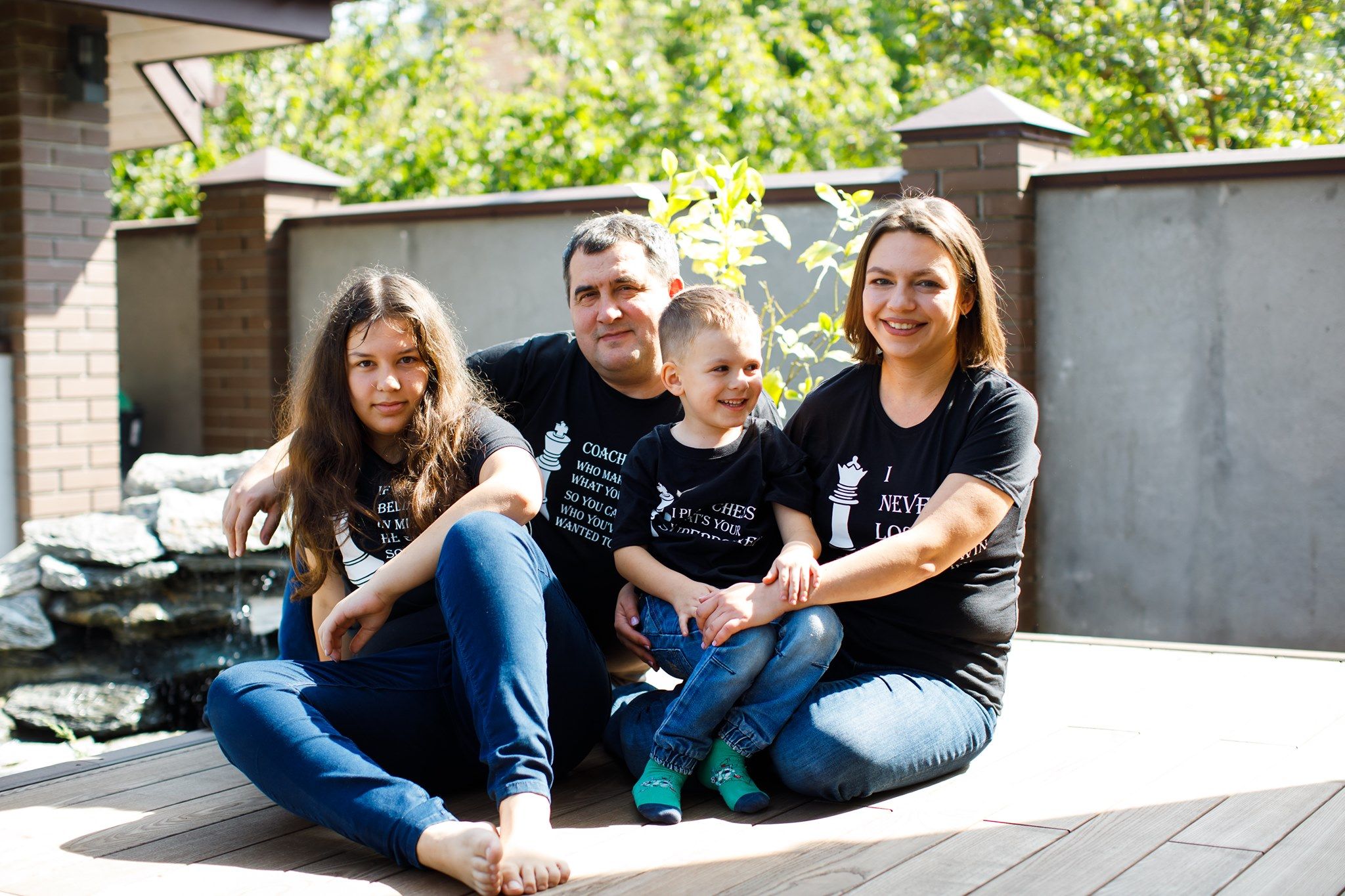
The family decided that Hrabrinska would leave for Germany together with the 15-year-old daughter and five-year-old son. It took them two and a half days to reach Poland, where they received "great support" according to Hrabrinska. "You only need to show a Ukrainian passport to be allowed on the trains for free."
The family was picked up by the husband of her sister, who drove them to Frankfurt, from where they are following the news and trying to speak to Grabinsky every day.
"His mood is up and down, mostly down. But he continues to provide online chess lessons. The thing is, the children are all without school and also feel depressed. He still has two groups of about 15 kids each. He is not a military person; he thinks it's the best he can do now."
Future
What will happen in the coming days, weeks, or months?
"There seems to be no end in sight," said Hrabrinska. “They apparently want to kill anybody, they keep targeting civil objects, bombarding houses, schools, hospitals. I cannot imagine there can be a compromise without help from abroad. Being peaceful against Putin will not help. If the west keeps staying peaceful it provokes only more problems."
"Putin probably made a huge blunder," said Kryvoruchko. "Most probably he was expecting to reach Kyiv in a few days and not foreseeing all these sanctions at all. The price he had to pay has become much greater."
Even if they would make more progress, Kryvoruchko thinks it's problematic for Russia to occupy his country: "To occupy the big cities is impossible. Before the war, the population was about four million. Now maybe two, or one, but can you imagine one million civic people who hate you, who hate the Russian forces?"
"I don't know what will happen," said Golubev. "It turns out we are able to survive the first wave of attacks. The stakes are high for Putin."
Shevchenko is one of the few having a fairly defined picture. "For me, the situation is more or less clear," he said. "Russia either continues to attack and then, finally it can happen that mid-April or at the end of April, they will default both economically and politically. The other way is that some heads of the Russian government are seeing no progress and will come to conversations with our prime minister."
"I feel that obviously, Russian troops will try to attack Kyiv and I believe they will fail," said Matlak. "But unfortunately they could do big damage to our city, our lives. And remember, we are not only fighting for our freedom but for a peaceful Europe as well."
'Dvorkovich should resign'
Almost all of the Ukrainian players Chess.com spoke to are in agreement about one thing: that Arkady Dvorkovich, a former top politician in the Russian government, should resign as FIDE President.

"I think Dvorkovich should have resigned immediately," said Volokitin. "There should be new elections. With this leadership, FIDE is morally bankrupt. We've had 27 years with a FIDE president from Russia. It's time for a change."
"Dvorkovich simply cannot stay neutral," said Kryvoruchko. "Despite all the good things he has done for the chess world, generally speaking, it's impossible to keep the chair of president under these circumstances."
"I cannot judge from a technical side, but from a moral side, Dvorkovich should resign," said Golubev.
Eljanov is the only Ukrainian player we spoke to who isn't strongly in favor of Dvorkovich resigning. "I don't have an opinion about him. We should be waiting for his statement. If he will agree to distance himself from Russia completely then I don't see any point to change him. I think it's up to him and up to the FIDE General Assembly."
Ban Russian/Belarusian players?
Most Ukrainians are also in favor of banning Russian and Belarusian players, i.e. not even allowing them to play individual tournaments under the FIDE flag, as FIDE and the European Chess Union have decided.
"We must ask for a ban of Russian and Belarusian players," says Matlak. "The Russian tricolor right now equals support for Putin. I know of the letter where 44 players speak out against the war, but there are about two thousand titled players in Russia. 44 is a miserable number."
"I have good relations with many Russian players," said Kryvoruchko. "I saw the letter with 44 signatories, I saw GM Alexander Grischuk's speech. On the other hand, if they earn money by playing, they pay taxes and so they'll pay for the war."
"Men in Ukraine cannot leave their country, so they cannot play competitions due to a war with Russia. So, why Russians can play?" asks Moiseenko. "I have Russian friends but they should not be able to play tournaments during this war. There should be a clear rule. For example, we cannot play the European championship now. Why can they? Let's not allow them as long as their country is attacking us."
Eljanov feels that Russian players who are in favor of the war should be penalized strongly, but he is not sure about a ban for all. "Russian and Belarusian teams should be suspended for some time, but I am not sure about individual players. I don't know what is the best solution. In the German Bundesliga, Russian players can play only if they take a stand and sign some public letter against the war."
How to help?
Apart from the different options to donate (e.g. given above in this article), how can people help Ukraine? According to some of the grandmasters we spoke to, it's not enough to show a Ukrainian flag on Facebook or Twitter your profile, or just write that you are against the war.
"All people should join to help our country and our people to stop this horror. Otherwise, God forbid, if Russia beats Ukraine, Europe will be next," says Shevchenko. "Many people say 'no to war' but as I said on Nakamura's stream, it would be clear if you said this in 1941 but if you are from Russia or a foreign country, it's not clear which side you're on."
"Big thanks to all who support and help Ukrainian people to defend our motherland from Russia's aggression," said Matlak. "You can try financial aid, humanitarian, and help to our refugees. Every dollar is very important."
Moiseenko: "The whole world should work on how to stop the war in a week's time. Anything else is not important. The parties should come to some kind of agreement. Too many people are dying. Protest not just saying 'no war,' but to demand your government to help, close the sky, put pressure more than economically."
Chess.com was in touch with some other players as well. GMs Anna and Mariya Muzychuk have left the country and are safe. Anna wrote: "We are moving around Europe. But our parents, grandparents and most of the relatives stay in Ukraine. It’s very sad and painful to see and witness what’s happening."
GM Vasil Ivanchuk, a former world rapid and world blitz champion and generally the most successful Ukrainian player ever, is safe as well. For the moment, he declined to comment.
Update March 11, 2022: Ivanchuk is one of dozens of Ukrainian top players who have signed a letter that calls for a full ban on Russian and Belarusian chess players, coaches, arbiters, and officials from being involved in ECU events, as well as a meeting of the FIDE General Assembly to demand the immediate resignation of Dvorkovich.
See also:
- Top Tournaments Ban Karjakin; ECU Suspends Belarusian, Russian Federations
- 'Stop the war.' 44 Top Russian Players Publish Open Letter To Putin
- FIDE Condemns Military Action; Takes Measures Against Russia, Belarus
- FIDE Olympiad Won't Take Place In Russia; Ukrainian Federation Asks For Russian Ban
- In Support Of Ukraine: Chess.com's stance on the issue


